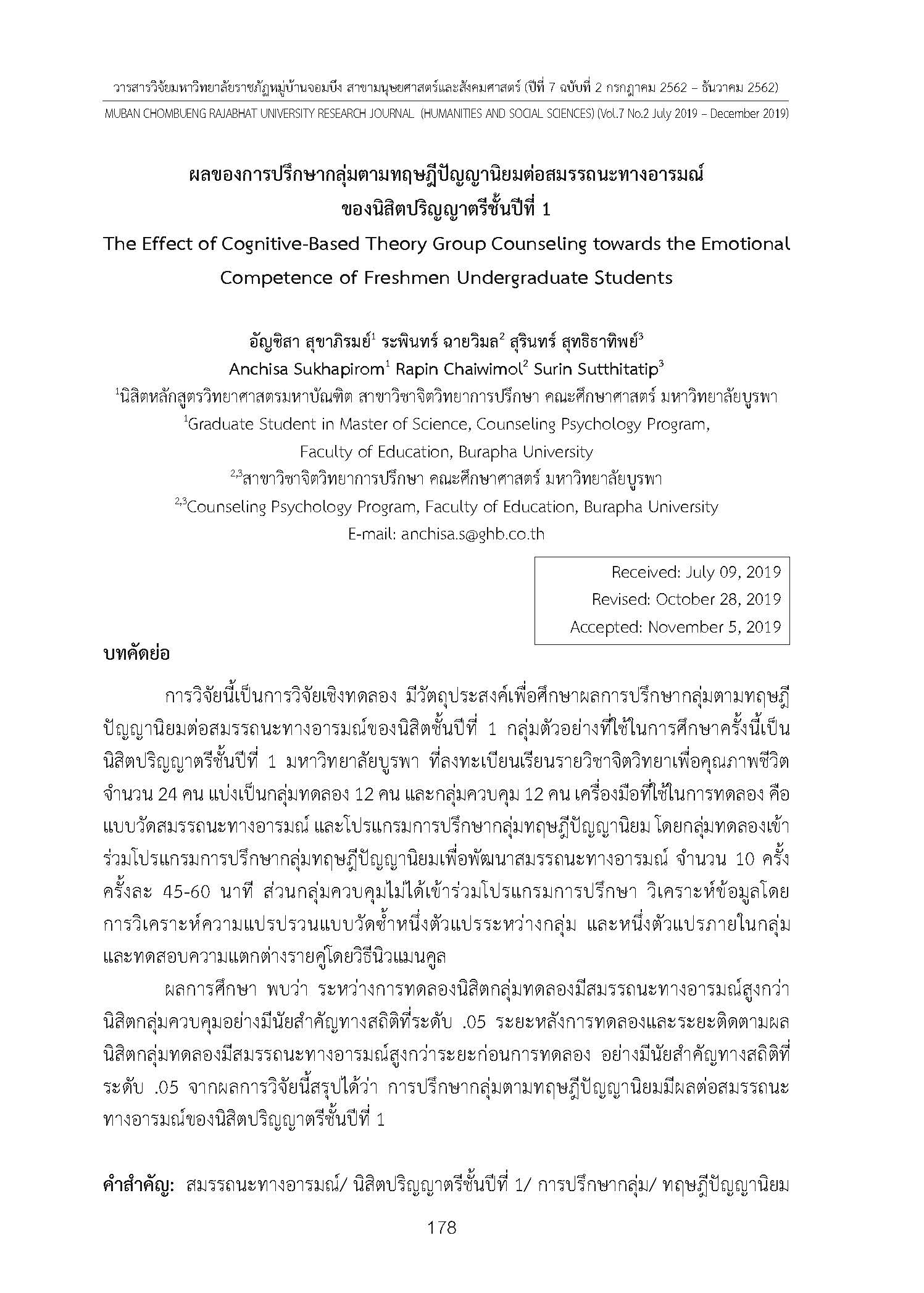ผลของการปรึกษากลุ่มตามทฤษฎีปัญญานิยมต่อสมรรถนะทางอารมณ์ ของนิสิตปริญญาตรี ชั้นปีที่ 1
คำสำคัญ:
สมรรถนะทางอารมณ์, นิสิตปริญญาตรีชั้นปีที่ 1, การปรึกษากลุ่ม, ทฤษฎีปัญญานิยมบทคัดย่อ
การวิจัยนี้เป็นการวิจัยเชิงทดลองมีวัตถุประสงค์เพื่อ ศึกษาผลการปรึกษากลุ่มตามทฤษฎีปัญญานิยมต่อสมรรถนะทางอารมณ์ของนิสิตชั้นปีที่ 1 กลุ่มตัวอย่างที่ใช้ในการศึกษาครั้งนี้เป็นนิสิตปริญญาตรีชั้นปีที่ 1 มหาวิทยาลัยบูรพา ที่ลงทะเบียนเรียนรายวิชาจิตวิทยาเพื่อคุณภาพชีวิต จำนวน 24 คน แบ่งเป็นกลุ่มทดลอง 12 คน และกลุ่มควบคุม 12 คน เครื่องมือที่ใช้ในการทดลองคือแบบวัดสมรรถนะทางอารมณ์ และโปรแกรมการปรึกษากลุ่มทฤษฎีปัญญานิยม โดยกลุ่มทดลองเข้าร่วมโปรแกรมการปรึกษากลุ่มทฤษฎีปัญญานิยมเพื่อพัฒนาสมรรถนะทางอารมณ์ จำนวน 10 ครั้ง ครั้งละ 45-60 นาทีส่วนกลุ่มควบคุมไม่ได้เข้าร่วมโปรแกรมการปรึกษา วิเคราะห์ข้อมูลโดยการวิเคราะห์ความแปรปรวนแบบวัดซ้ำหนึ่งตัวแปรระหว่างกลุ่ม และหนึ่งตัวแปรภายในกลุ่ม และทดสอบความแตกต่างรายคู่โดยวิธีนิวแมนคูล
ผลการศึกษา พบว่า ระหว่างการทดลองนิสิตกลุ่มทดลองมีสมรรถนะทางอารมณ์สูงกว่านิสิตกลุ่มควบคุมอย่างมีนัยสำคัญทางสถิติที่ระดับ .05 ระยะหลังการทดลองและระยะติดตามผลนิสิตกลุ่มทดลองมีสมรรถนะทางอารมณ์สูงกว่าระยะก่อนการทดลอง อย่างมีนัยสำคัญทางสถิติที่ระดับ .05 จากผลการวิจัยนี้สรุปได้ว่า การปรึกษากลุ่มตามทฤษฎีปัญญานิยมมีผลต่อสมรรถนะทางอารมณ์ของนิสิตปริญญาตรีชั้นปีที่ 1
เอกสารอ้างอิง
ดวงมณี จงรักษ์. (2556). ทฤษฎีการให้การปรึกษาและจิตบำบัด (พิมพ์ครั้งที่ 6). กรุงเทพฯ: สมาคมส่งเสริมเทคโนโลยี (ไทย-ญี่ปุ่น).
นันทิชา บุญละเอียด. (2554). การปรับตัวของนิสิตระดับปริญญาตรีชั้นปีที่ 1 คณะวิทยาศาสตร์ มหาวิทยาลัยบูรพา. วิทยานิพนธ์วิทยาศาสตรมหาบัณฑิต, สาขาวิชาสถิติ คณะวิทยาศาสตร์ มหาวิทยาลัยบูรพา.
ประภาส ปานเจี้ยง. (2558) .ปัจจัยที่ส่งผลต่อความฉลาดทางอารมณ์และรูปแบบการพัฒนาความฉลาดทางอารมณ์ของนักศึกษาสถาบันอุดมศึกษาในจังหวัดสงขลา. คณะศิลปศาสตร์และศึกษาศาสตร์ มหาวิทยาลัยหาดใหญ่ สงขลา.
พระพรหมคุณาภรณ์ (ป.อ.ปยุตฺโต). (2543). พัฒนาการแบบองค์รวมของเด็กไทยฯ. สืบค้นเมื่อ 8 เมษายน 2560, จากhttp://www.watnyanaves.net/uploads/File/books/pdf/integrated_development_of_thai_children.pdf.
สำนักงานราชบัณฑิตยสภา. (2557). การศึกษาแบบองค์รวม. จาก http://www.royin.go.th/?knowledgeledges=การศึกษาแบบองค์รวม.
โสภิตา พุ่มดียิ่ง. (2547). การอนุมานสาเหตุความรับผิดชอบและการเผชิญปัญหาด้านการเรียนของนิสิตนักศึกษาที่มีผลการเรียนสูงและต่ำ. วิทยานิพนธ์ศิลปะศาสตร์มหาบัณฑิต, สาขาวิชาจิตวิทยาการปรึกษา คณะจิตวิทยา จุฬาลงกรณ์มหาวิทยาลัย.

ดาวน์โหลด
เผยแพร่แล้ว
รูปแบบการอ้างอิง
ฉบับ
ประเภทบทความ
สัญญาอนุญาต
วารสาร TCI อยู่ภายใต้การอนุญาต Creative Commons Attribution-NonCommercial-NoDerivatives 4.0 International (CC BY-NC-ND 4.0) เว้นแต่จะรุบุไว้เป็นอย่างอื่นโปรดอ่านหน้านโยบายของเราสำหรับข้อมูลเพิ่มเติมเกี่ยวกับการเช้าถึงแบบเปิด ลิขสิทธิ์ และการอนุญาต


